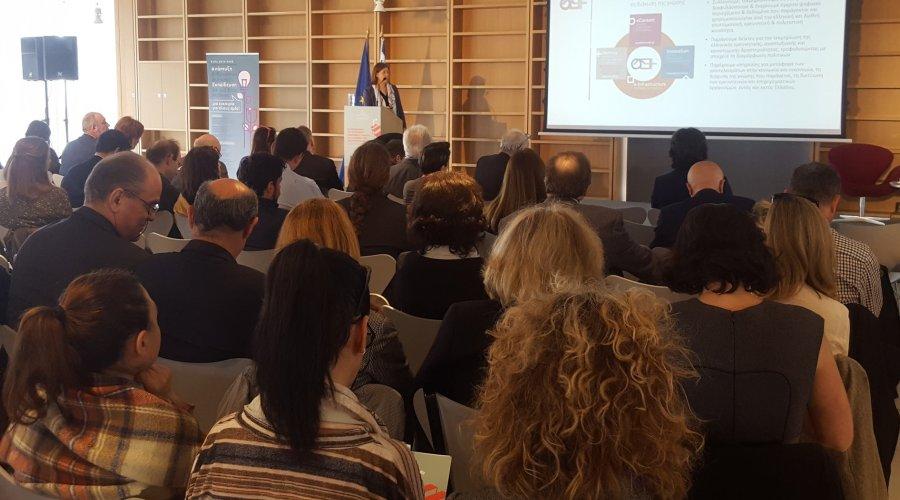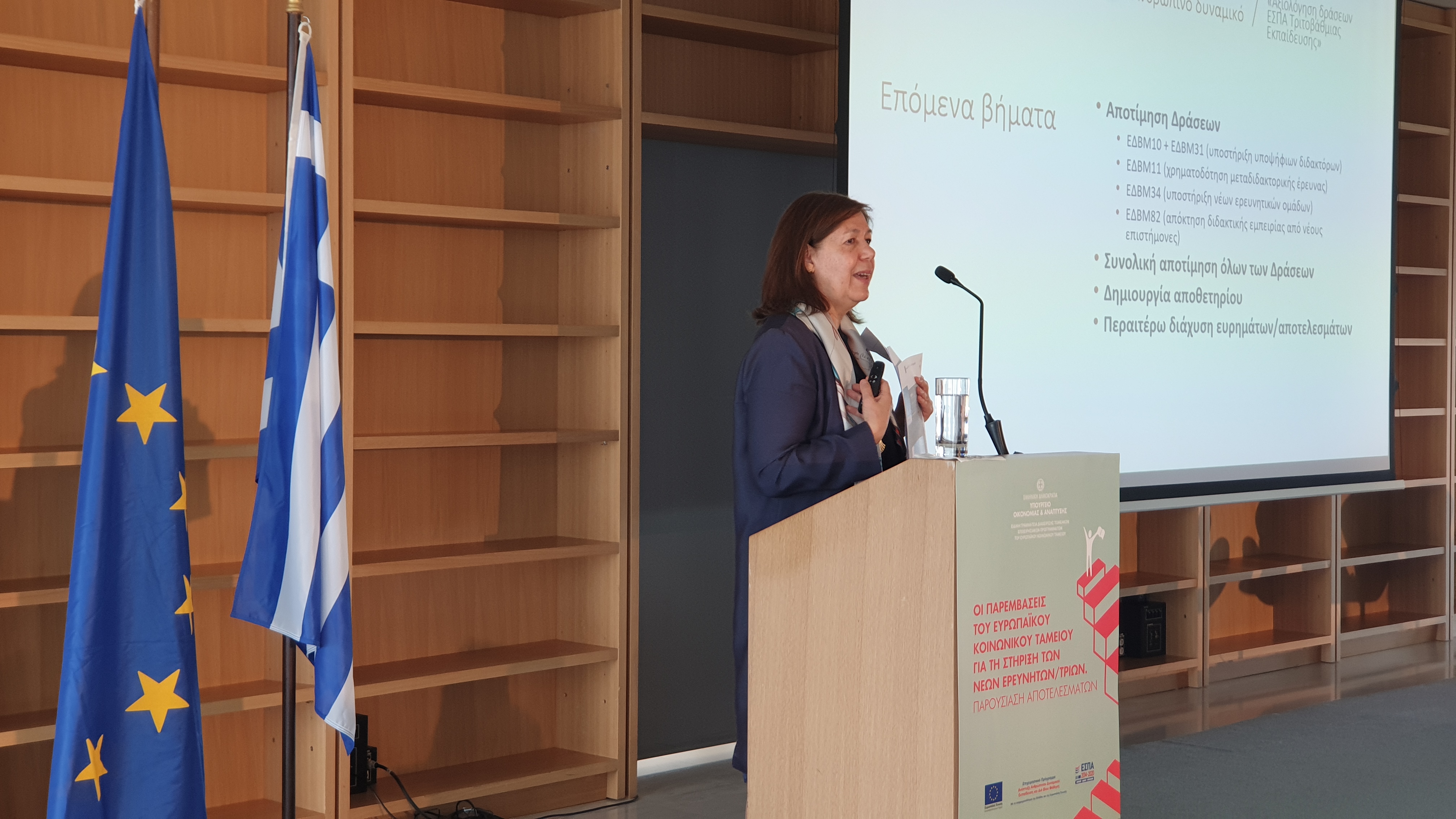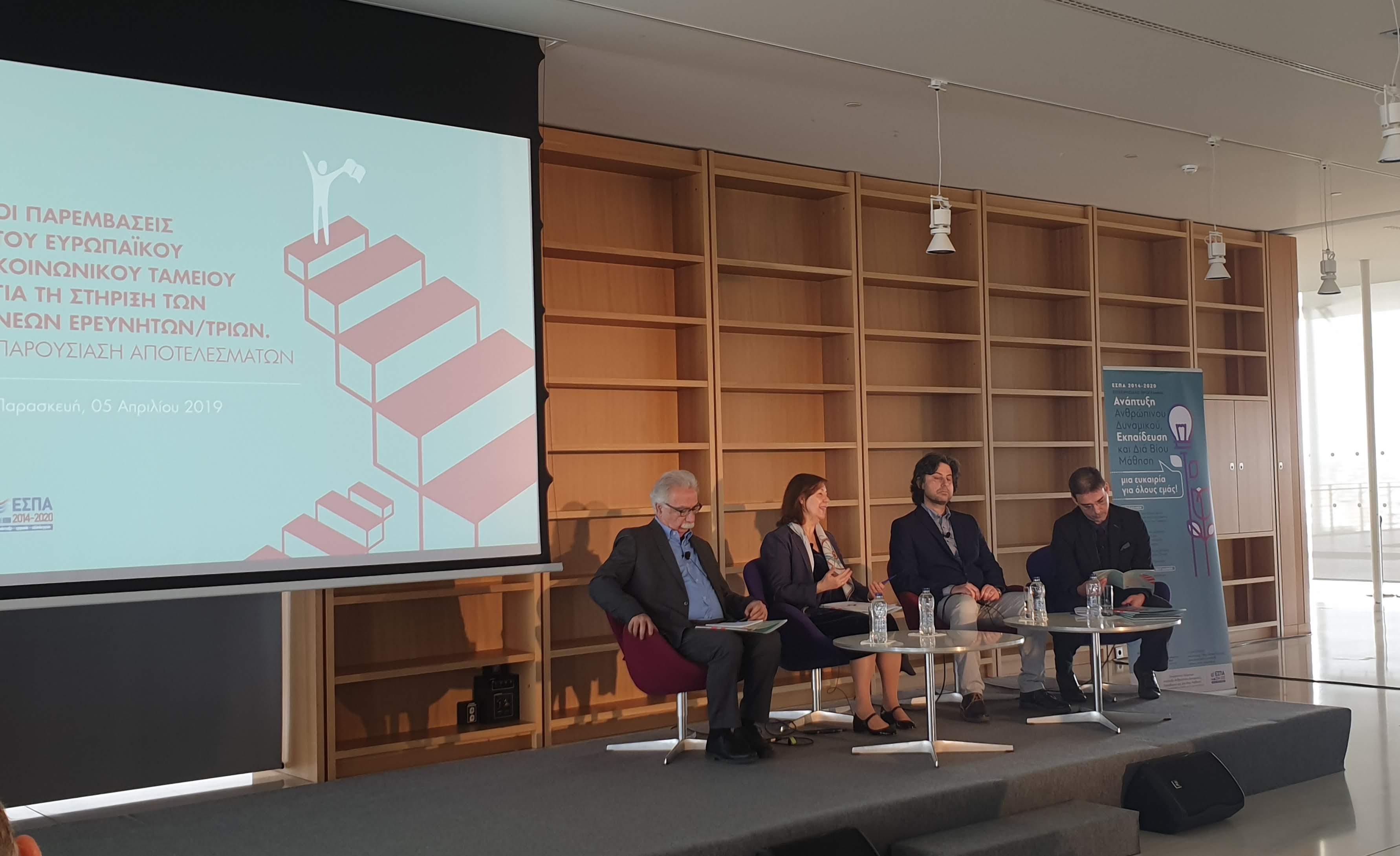
The results of the interventions of the European Social Fund in supporting researchers, were presented by EKT, as the body responsible for implementing the evaluation of the action. The event, organised by the Special Secretariat for the Management of Sectoral OPs of the European Social Fund (ESF), was held on Friday April 5 at the Stavros Niarchos Foundation Cultural Centre, in the presence of representatives of public institutions, academic and research organisations.
Dr. Evi Sachini, EKT Director, began her presentation by making a brief reference to the role played by the National Documentation Centre (EKT) in the dissemination of knowledge in the country and the emergence and development of specialised human resources. She continued by noting that the evaluation of the interventions of the European Social Fund is as important as their implementation: both enable policy makers to have the information needed to promptly make the necessary modifications, and also reflects the effectiveness of the measures as perceived by the beneficiaries themselves.

Focusing on the impact of measures for a) scholarships for doctoral candidates, (b) grants post-doctoral researchers, (c) the acquisition of academic teaching experience for new scientists and (d) financing research teams consisting of new researchers, Dr. Evi Sachini highlighted the important findings of the survey which included all beneficiaries and had a high response rate of 80%.
A number of these findings are:
- 4,500 scientists participated in the actions of the European Social Fund
- 2,700 scientists benefited from assistance from the European Social Fund
- 66.1% of doctoral candidates and 32.2% of young researchers who participated in the action, had no other employment during the same period.
- 39.4% of all beneficiaries who were considering moving abroad, said that participation in actions prevented them from doing so.
The mapping of skills and competences acquired by beneficiaries of actions, as indicated by the publications of EKT, is the basis for investigating the degree of success of these publicly funded actions. Additionally, monitoring the progress of individual cycles of the Actions at the time of their implementation and taking into account the views of beneficiaries, has been an innovative practice, as it allowed the provision of timely information and the modification of the actions by the Special Secretariat for optimising effect and impact of specific public interventions.Evaluation results of the actions are available on the EKT metrics.ekt.gr page and are summarised in a press release.
EKT's next steps include the continuation of the mapping and evaluation of the results of subsequent cycles of the Action, providing relevant information to the Special Secretariat for Management of Sectoral Operational Programmes - European Social Fund, thus contributing to the optimisation of the implementation process and the achievement of objectives. It will also develop and make available a digital repository in which to aggregate research results generated by the beneficiaries in the context of the Action with a view to their dissemination to meet the needs of Open Science.
The event began with a greeting by Patrick Paquet, Representative of DG Employment, Social Affairs and Inclusion European Commission, who pointed out that the European Social Fund has allocated so far 4.4 billion euros to alleviate the consequences of the crises in employment, education and social policies. The Special Secretary for the Management of Sectoral Operational Programmes - ESF (Ministry of Economy & Development), Giorgos Ioannidis, stated that the consistency and continuity of actions implemented so far for researchers have prevented many of them from leaving the country.

The Minister of Education, Research & Religious Affairs, Constantine Gavroglou, made specific reference to the new structuring of higher education, which will be ongoing until 2020, and focusing on the need for 'partnership bridges' between Greek researchers worldwide. Finally, Paris Vassalos, Assistant Professor at the Athens University of Economics and Scientific Director of the Single Research Evaluation Platform, introduced this particular platform. The event concluded with an open discussion and questions from the audience.
The event was organised by the Ministry of Economy & Development and the Special Secretariat for the Management of Sectoral OPs of the European Social Fund (ESF), Special Secretariat for the Management of Sectoral Programmes "Human Resources, Development - Education and Lifelong Learning".
European Social Fund Interventions
The actions were first started implemented in 2016 with the main objective being to reverse the exodus of young scientists abroad and to create a stable environment to support young researchers in the country. These actions are part of a comprehensive strategy to support the country's research personnel, and at this time, the Operational Programme "Human Resources Development - Education and Lifelong Learning" is the most important Operational Programme in view of the number of people who benefit from higher education.
Links
- Press Release regarding the four new studies of EKT
- metricsΕΚΤ - Indicators & Statistics for Research, Development, Innovation
- Event's Video
- Operational Programme "Human Resources Development, Education and Lifelong Learning"
- Special Secretariat for the Management of Sectoral OPs of the European Social Fund (ESF)








